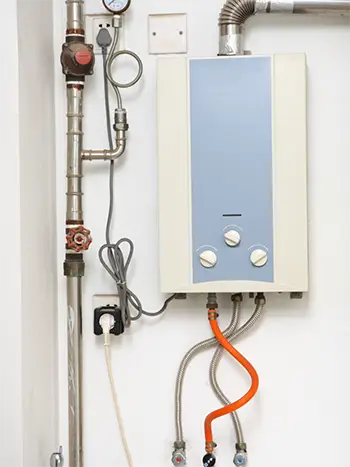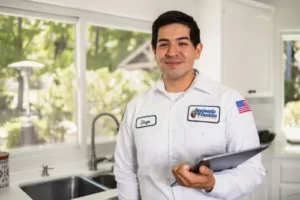 Tankless water heaters are one of the modern conveniences many of us rely on without giving much thought. They provide hot water on demand, take up less space than traditional tank water heaters, and are energy-efficient.
Tankless water heaters are one of the modern conveniences many of us rely on without giving much thought. They provide hot water on demand, take up less space than traditional tank water heaters, and are energy-efficient.
But, like anything else, they need regular maintenance. One of the most common questions homeowners ask is: How often should I flush my tankless water heater?
Let’s get straight to the point. You should flush your tankless water heater at least once a year. If you live in an area with hard water, you may need to flush it more often, around every six to nine months.
Now let’s talk a little more about flushing your tankless water heater…
Key Takeaways
- Flush your tankless water heater at least once a year.
- If you have hard water, flush every six to nine months.
- Regular maintenance extends your unit’s lifespan and saves energy.
- Mineral buildup from hard water can damage your unit if not properly addressed.
What Is a Tankless Water Heater?
A tankless water heater, sometimes called an on-demand water heater, does exactly what the name implies—it heats water as you need it. Unlike traditional water heaters, which store gallons of water in a tank and continuously heat it, tankless units use high-powered burners to quickly heat water whenever you turn on the tap.
These units are compact, making them ideal for homes with limited space. Also, since they heat water only when needed, they can save you 30 to 50% on energy costs. This is compared to larger, tank-based hot water heaters.
Instead of constantly reheating stored water, tankless units provide hot water instantly, which means you’re never paying to heat water you aren’t using. Sounds great, right? But as you’ll soon learn, they require some TLC to keep them in peak shape.
Tankless Gas Water Heater vs. Tankless Electric Water Heater
There are two main types of tankless water heaters: gas and electric. Both serve the same purpose but differ slightly in their operation and maintenance needs.
Tankless Gas Water Heater:
- Uses natural gas or propane to heat water.
- Great for large families with high hot water demands.
- Typically requires more maintenance and is less energy-efficient than electric models.
Tankless Electric Water Heater:
- Easier to troubleshoot and maintain.
- More energy-efficient, which is great for saving on utility bills.
- Electricity prices tend to be more stable than gas prices.
Whether you have a gas or electric model, regular maintenance—like flushing—is essential for both types to prevent costly repairs down the road.
Why You Should Flush Your Tankless Water Heater
Let’s talk about why flushing your tankless water heater is so important. Over time, minerals like calcium and magnesium from your water supply can build up inside your unit. These minerals form a layer of sediment, which clogs the heat exchanger and reduces the unit’s efficiency.
Think of it like cholesterol building up in your arteries. Just as clogged arteries restrict blood flow, mineral buildup restricts water flow through the heat exchanger.
The result? Your water heater has to work harder to heat the water, which means it’s burning more energy. Eventually, that could lead to a breakdown.
Skipping regular flushing can lead to the following:
- Obstructed pipes: When mineral deposits build-up, they restrict water flow.
- Reduced efficiency: Your water heater has to work harder to heat water, driving up your energy bills.
- Potential damage: If left unaddressed, this buildup can cause your unit to fail, potentially leading to water damage in your home.
How Often Should You Flush a Tankless Water Heater?
 Most experts recommend flushing your tankless water heater once a year. That’s the standard. But if you live in an area with hard water—like many parts of Florida—you should be doing it every six to nine months. Hard water contains more minerals, which means it causes buildup faster than soft water.
Most experts recommend flushing your tankless water heater once a year. That’s the standard. But if you live in an area with hard water—like many parts of Florida—you should be doing it every six to nine months. Hard water contains more minerals, which means it causes buildup faster than soft water.
To figure out what’s right for your home, it’s smart to consult a professional, like the punctual plumbers at Service Minds Benjamin Franklin. They can help you determine the best schedule based on your local water quality.
Benefits of Flushing a Tankless Water Heater
So, what’s in it for you if you keep up with regular flushing? Here are some key benefits:
- Extend Lifespan: Regular flushing can help your unit last up to 20 years or more.
- Fewer Repairs: By preventing buildup, you reduce the chances of something breaking down.
- Better Efficiency: A clean unit heats water more efficiently, which saves you money on your energy bill.
- Prevent Scaling: Avoid clogs and other issues caused by mineral buildup.
- Quieter Operation: No one likes a noisy water heater. Regular maintenance helps keep things running smoothly.
- Reduced Heating Times: A well-maintained unit heats water faster.
- Energy Savings: Over time, a more efficient water heater saves you big on energy costs.
What Happens if I Don’t Flush My Tankless Water Heater?
Skipping the flushing process isn’t something you want to gamble on. Here’s what could happen:
- Clogs: The mineral buildup can cause blockages inside the unit.
- Inconsistent Hot Water: You might notice fluctuating water temperatures.
- Overheating: When your unit has to work harder, it can overheat, reducing its efficiency and lifespan.
Letting these issues go unchecked could end up costing you more in repairs than you would have spent on regular water heater maintenance.
What is Hard Water and How Does it Impact My Tankless Water Heater?
Hard water refers to water that contains high levels of dissolved minerals, primarily calcium and magnesium. These minerals are harmless to drink but can wreak havoc on your plumbing.
If you live in an area with moderately hard water, like Niceville, FL, you’ll need to be more vigilant about maintaining your tankless water heater. Hard water causes faster buildup, meaning you’ll need to flush your unit more often—every six to nine months.
Hard water can also shorten the lifespan of your tankless water heater. Using descaling solutions during regular flushing can help reduce the impact of hard water on your system.
Do I Need a Professional to Flush My Tankless Water Heater?
While it’s possible to flush your tankless water heater on your own, the process isn’t exactly a walk in the park. It involves shutting off the unit, connecting hoses, and using a pump to circulate a cleaning solution through the system. If that sounds like a headache, you’re not alone.
If you’re comfortable with DIY projects, there are plenty of step-by-step guides online. But if you’re unsure, it’s worth bringing in a professional.
Service Minds Benjamin Franklin Provides Water Heater Services
![]() Whether you need help with flushing, repairs, or a complete replacement, Service Minds Benjamin Franklin has you covered. Their team of experts specializes in maintaining both traditional and tankless water heaters. Plus, their “punctual plumbers” are known for showing up on time—because your time is important, too.
Whether you need help with flushing, repairs, or a complete replacement, Service Minds Benjamin Franklin has you covered. Their team of experts specializes in maintaining both traditional and tankless water heaters. Plus, their “punctual plumbers” are known for showing up on time—because your time is important, too.
Got a question about your water heater? Need to schedule an appointment? Give them a call. They’re happy to help keep your water heater in tip-top shape.
FAQs
If you’re still unsure about flushing your tankless water heater, you’re not alone. Here are answers to some common questions:
Can I flush my tankless water heater myself?
Yes, but it requires some technical know-how. If you’re comfortable working with tools and following a step-by-step guide, you can try it. However, if you’re not confident, it’s best to hire a professional.
What kind of cleaning solution do I use?
Most people use a vinegar solution to break down mineral deposits. However, descaling solutions designed for water heaters are also available.
How do I know if I have hard water?
If you notice frequent buildup in faucets or appliances, or you see white residue on dishes and glassware, you likely have hard water.
What’s the difference between flushing and descaling?
Flushing clears out mineral deposits, while descaling involves using a cleaning solution to break down those deposits.
How long does it take to flush a tankless water heater?
The process usually takes between 45 minutes to an hour, depending on your experience level.
Final Thoughts
Flushing your tankless water heater regularly is a small but essential task that pays off in the long run. By keeping your unit clean, you’re extending its lifespan, saving energy, and avoiding potential problems down the road.
If you’re in the Niceville, FL area and need professional maintenance, Service Minds Benjamin Franklin is your go-to for water heater services—whether you have a traditional tank or a tankless unit.